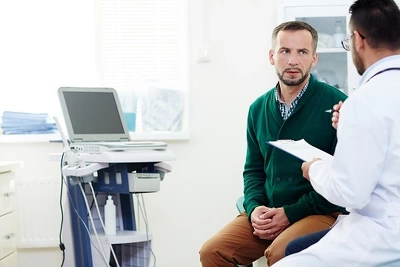Urology is the branch of medicine concerned with the study of the pathogenesis, symptoms and methods of diagnosis, treatment and prevention of pathologies of the urogenital system in men and of the urinary system in women.


Bila Tserkva

Addresses of the Clinics
+38 (073) 073-03-85 +38 (096) 665-57-97 +38 (099) 353-91-84
Monday-Sunday 08:30 - 20:00
Urology is the branch of medicine concerned with the study of the pathogenesis, symptoms and methods of diagnosis, treatment and prevention of pathologies of the urogenital system in men and of the urinary system in women.

Urology is a branch of medicine dealing with the study of pathogenesis, symptoms and methods of diagnosis, treatment and prevention of pathologies of the urogenital system in men and urinary system in women. These diseases affect your quality of life and are fraught with dangerous complications. If you have any of these symptoms, you should be seen by a urologist as soon as possible. Urology is represented by a modern department in CBS at 37-A Gagarina Street. Here you can undergo complex diagnostics and treatment of detected diseases.
A urologist is a specialist in the diagnosis, treatment and prevention of diseases of the urogenital system and retroperitoneal organs. Progressive urology uses a conservative approach (pharmacotherapy, physiotherapy) as well as surgical methods, which are necessary for complicated pathologies and congenital or acquired defects of the urogenital system.
Consultation with a urologist is required for the identification and treatment of urological diseases of various etiologies. The list of such diseases include:
An appointment with a urologist should be made for the following symptoms of urological disorders:
A urologist should be consulted regularly if there are chronic urological disorders. Annual consultations with a urologist are also necessary for all men over the age of 35. After the age of 45, you should see this specialist twice a year.
During the appointment, the urologist listens carefully to all of the patient's complaints and asks follow-up questions that help to clarify the nature and root cause of the abnormality. As a rule, the doctor is interested in:
Initial diagnosis of urological diseases includes palpation and percussion of the genitourinary organs. Men undergo a finger rectal examination of the prostate gland to assess its condition and rule out cancerous pathologies. The doctor then prescribes additional instrumental and/or laboratory tests that help to gather more information about the clinical picture of the disorder and make a correct diagnosis.
The following methods are used for diagnosis in urology:
If necessary, a further examination or differential diagnosis by other specialists (endocrinologist, cardiologist, oncologist, gynaecologist, dermatovenerologist, etc.) is carried out.
State-of-the-art diagnostic methods help to determine the nature, extent and localisation of pathological changes in a short period of time. Based on the findings, the urologist draws up an individualised plan for conservative therapy or performs surgical treatment of urological diseases.
After the initial consultation and the results of the laboratory and instrumental tests, a follow-up appointment with a specialist is necessary to advise on further treatment. This may include:
At the Department of Urology at CBS, shockwave therapy is used to treat many pathologies. This physiotherapeutic method is based on the directional effect of high-frequency sound waves. They do not violate the integrity of tissues and stimulate regenerative processes.
Shockwave therapy in urology is conducted with the BTL-6000 SWT. This equipment allows the doctor to treat lesions with acoustic waves of a certain frequency, which can penetrate deep tissues. SWT reduces inflammation and swelling, improves blood circulation and relieves pain and cramps. The method can be used to treat non-infectious and calculous prostatitis, chronic pelvic pain syndrome, erectile dysfunction, prostate adenoma and Peyronie's disease. The number of sessions is determined individually. Positive results are achieved in more than 90% of clinical cases.
If it is impossible to eliminate the pathology identified by conservative methods, surgical treatment is recommended to the patient. Surgery in urology is divided into endoscopic and traditional operations.
If you need to make an appointment to see a urologist for a consultation on symptoms of concern or treatment of previously diagnosed urological abnormalities, please contact the contact centre operators at CBS. You can also schedule a visit to a urologist on the Clinic's website or via the feedback form. Timely urologist consultation, the price of which is affordable for people with different incomes, will help prevent complications and start an effective course of treatment of detected pathologies.